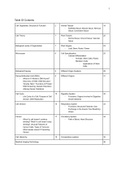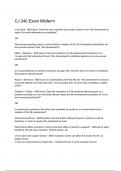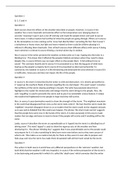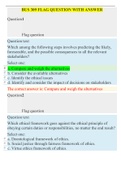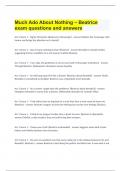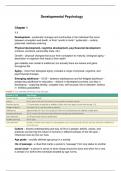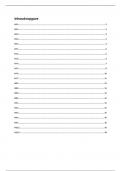Introduction to
chemistry (matter
& measurements)
DR G MNGUNI
DEPARTMENT OF ENVIRONMENTAL HEALTH
MANGOSUTHU UNIVERSITY OF TECHNOLOGY
2020
,Definitions
• What is chemistry?
Science that deals with substances of which matter is composed, th
investigation of their properties and reactions under different
conditions, and the use of such reactions to form new substances.
Example
Baking is a series of complex chemical reactions. Flour contains two important
proteins – glutenin and gliadin. Adding water results in chemical bonding betw
these proteins to form a new protein – gluten. Baking powder reacts with acids
the dough to produce carbon dioxide (CO2) which causes the dough to rise.
,• Atom
Smallest constituent unit of ordinary matter that has properties of a chemical elem
Solids, liquids, gases and plasma are composed of neutral or ionized atoms. Size –
picometers.
• Electron
Negatively charged subatomic particle, symbol e- or β-. It can either be free or bo
to the nucleus of an atom. Has the smallest electrical charge. Is attracted to proto
of atomic nuclei to form atoms. Has a mass of 1/1836 of a proton.
• Proton
A subatomic particle, symbol p or p+ with a positive electric charge and a mass sli
less than that of a neutron.
• Neutron
A subatomic particle, symbol n or n0 with no electric charge and a mass slightly la
than that of a proton
• Molecule
An electrically neutral group of two or more atoms held together by chemica
bonds. Represents the smallest fundamental unit of a chemical compound.
, Ion
An atom or molecule (group of atoms) with a net electric charge due to the loss o
gain of one or more electrons i.e. total number of electrons is not equal to its total
number of protons
Made of neutrons, protons and electrons – move near electricity
Process of making an ion from an atom or molecule – ionisation
Ionized atom has two ions, one negatively charged and one positively charged.
Example - H2 has one proton and one electron. When heated it breaks into two parts, a
positively charged hydrogen ion (H+) and a negatively charged electron.
Sodium can loose the outermost electron resulting in a sodium ion.
chemistry (matter
& measurements)
DR G MNGUNI
DEPARTMENT OF ENVIRONMENTAL HEALTH
MANGOSUTHU UNIVERSITY OF TECHNOLOGY
2020
,Definitions
• What is chemistry?
Science that deals with substances of which matter is composed, th
investigation of their properties and reactions under different
conditions, and the use of such reactions to form new substances.
Example
Baking is a series of complex chemical reactions. Flour contains two important
proteins – glutenin and gliadin. Adding water results in chemical bonding betw
these proteins to form a new protein – gluten. Baking powder reacts with acids
the dough to produce carbon dioxide (CO2) which causes the dough to rise.
,• Atom
Smallest constituent unit of ordinary matter that has properties of a chemical elem
Solids, liquids, gases and plasma are composed of neutral or ionized atoms. Size –
picometers.
• Electron
Negatively charged subatomic particle, symbol e- or β-. It can either be free or bo
to the nucleus of an atom. Has the smallest electrical charge. Is attracted to proto
of atomic nuclei to form atoms. Has a mass of 1/1836 of a proton.
• Proton
A subatomic particle, symbol p or p+ with a positive electric charge and a mass sli
less than that of a neutron.
• Neutron
A subatomic particle, symbol n or n0 with no electric charge and a mass slightly la
than that of a proton
• Molecule
An electrically neutral group of two or more atoms held together by chemica
bonds. Represents the smallest fundamental unit of a chemical compound.
, Ion
An atom or molecule (group of atoms) with a net electric charge due to the loss o
gain of one or more electrons i.e. total number of electrons is not equal to its total
number of protons
Made of neutrons, protons and electrons – move near electricity
Process of making an ion from an atom or molecule – ionisation
Ionized atom has two ions, one negatively charged and one positively charged.
Example - H2 has one proton and one electron. When heated it breaks into two parts, a
positively charged hydrogen ion (H+) and a negatively charged electron.
Sodium can loose the outermost electron resulting in a sodium ion.

